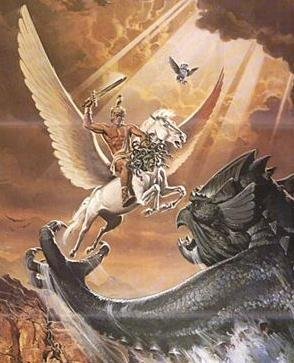CLASH OF THE TITANS (1981 Version): A Last Hurrah For The God Of Stop-Motion
As the 1980's began, Ray Harryhausen found himself out of step with the state of special effects. With the stunning opticals of Star Wars on the left and the dazzling makeup effects from Rick Baker/Rob Bottin/etc. on the right, Harryhausen's painstaking but distinctly homegrown stop-motion effects looked downright primitive. Clash Of The Titans is his final film to date as an effects designer and, as such, represents the last hurrah for his style of handcrafted effects-driven fantasy filmmaking. The plot is loosely derived from Greek mythology and focuses on Perseus (Harry Hamlin), a young mortal man who does not know he is the son of Zeus (Sir Laurence Olivier), the King of the Gods. He has a place of prominence amongst Zeus' creations and the favoritism he receives, combined with Zeus's egotistical and often selfish style of ruling, causes his fellow gods to chafe. Thetis (Maggie Smith) in particular is angered by how Zeus has punished her son Calibos (Neil McCarthy) in a cruel way so she retaliates by snatching him from his peaceful home and placing him in a larger city.However, Thetis' impetuous actions boomerang on her when Perseus falls in love with Andromeda (Judi Bowker), a princess in thrall to the dark powers of Calibos. Hamlin succeeds in defeating Calibos
The plot is loosely derived from Greek mythology and focuses on Perseus (Harry Hamlin), a young mortal man who does not know he is the son of Zeus (Sir Laurence Olivier), the King of the Gods. He has a place of prominence amongst Zeus' creations and the favoritism he receives, combined with Zeus's egotistical and often selfish style of ruling, causes his fellow gods to chafe. Thetis (Maggie Smith) in particular is angered by how Zeus has punished her son Calibos (Neil McCarthy) in a cruel way so she retaliates by snatching him from his peaceful home and placing him in a larger city.However, Thetis' impetuous actions boomerang on her when Perseus falls in love with Andromeda (Judi Bowker), a princess in thrall to the dark powers of Calibos. Hamlin succeeds in defeating Calibos 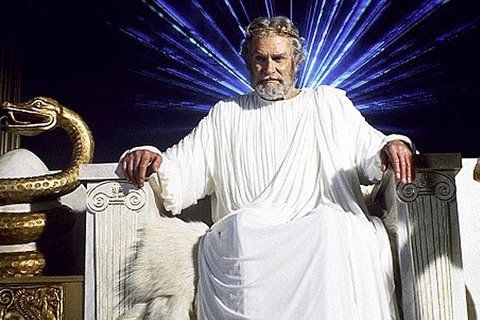 with the help of magical weapons from Zeus and a little help from Ammon (Burgess Meredith), a wizened old playwright/poet who acts as an earthly father figure for Perseus. Perseu's actions cause Thetis to put a curse on the town: either Andromeda must sacrifice herself to a fearsome sea-beast known as the Kraken or her home will perish. Perseus decides to defeat Thetis' curse and enlists a band of heroes to help him find a weapon to defeat the Kraken.
with the help of magical weapons from Zeus and a little help from Ammon (Burgess Meredith), a wizened old playwright/poet who acts as an earthly father figure for Perseus. Perseu's actions cause Thetis to put a curse on the town: either Andromeda must sacrifice herself to a fearsome sea-beast known as the Kraken or her home will perish. Perseus decides to defeat Thetis' curse and enlists a band of heroes to help him find a weapon to defeat the Kraken.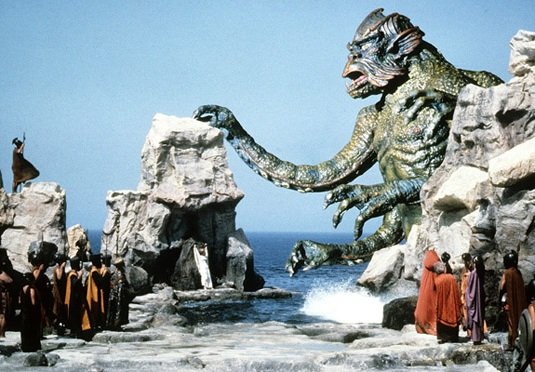 The best thing about Clash Of The Titans is its sense of wonder. Both the actors and the filmmakers play the colorful storyline with a straight face. There's no post-modern irony or meta-anything to be found in this film. It's really nice to see a film where the people who made it don't feel like they have to apologize for the genre in any way or give it some sort of self-consciously "serious" slant. As far as Harryhausen and company are concerned, flying horses and giant scorpions are cool and they get treated with an appropriate "gee-whiz" sensibility that is often disarming.
The best thing about Clash Of The Titans is its sense of wonder. Both the actors and the filmmakers play the colorful storyline with a straight face. There's no post-modern irony or meta-anything to be found in this film. It's really nice to see a film where the people who made it don't feel like they have to apologize for the genre in any way or give it some sort of self-consciously "serious" slant. As far as Harryhausen and company are concerned, flying horses and giant scorpions are cool and they get treated with an appropriate "gee-whiz" sensibility that is often disarming.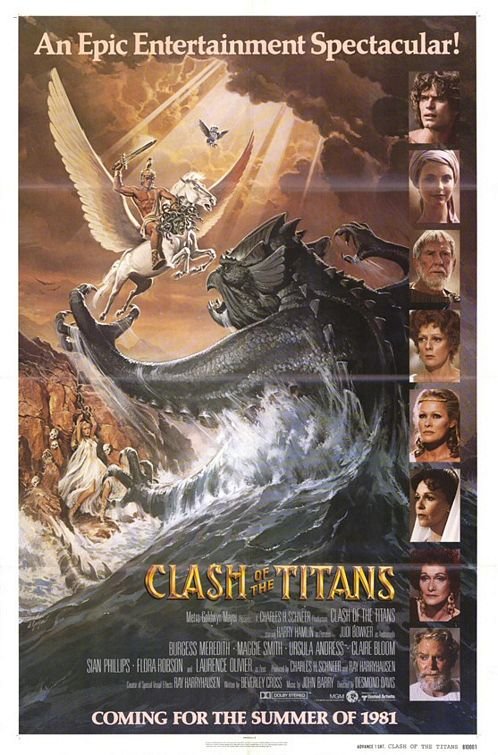 It's a good thing that Clash Of The Titans has this sensibility because it's got a lot of problems in other departments. At nearly two hours, the film suffers from stretches where the pace drags. This is mainly because the story, characterizations and any other non-effects concerns are subordinate to the pursuit of visual-effects spectacle. This could be overlooked if the effects were mindblowing but unfortunately they tend to be rather inconsistent. There's a one-to-one ratio of effects that work in the proper classic style with effects that are either poorly animated (the Kraken) or rear-projection/process shots that are so dim and scratchy that they pull you right out of the fantasy. As for robot-owl Bubo, an obvious and badly-misguided attempt to emulate the comic-relief of R2-D2 in the Star Wars films, well... the less said, the
It's a good thing that Clash Of The Titans has this sensibility because it's got a lot of problems in other departments. At nearly two hours, the film suffers from stretches where the pace drags. This is mainly because the story, characterizations and any other non-effects concerns are subordinate to the pursuit of visual-effects spectacle. This could be overlooked if the effects were mindblowing but unfortunately they tend to be rather inconsistent. There's a one-to-one ratio of effects that work in the proper classic style with effects that are either poorly animated (the Kraken) or rear-projection/process shots that are so dim and scratchy that they pull you right out of the fantasy. As for robot-owl Bubo, an obvious and badly-misguided attempt to emulate the comic-relief of R2-D2 in the Star Wars films, well... the less said, the 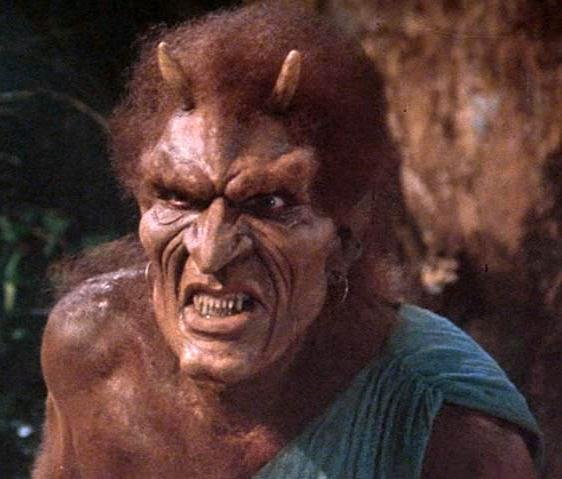 better.Despite these serious problems, Clash Of The Titans can stll be a lot of fun if viewed in the right nostalgic, forgiving mood. The film's cast is a lot of fun to watch: Olivier barks his lordly lines with a knowingly campy sense of authority, Bowker is lovely as the maiden fair and the many supporting English thesps like Maggie Smith and Claire Bloom add a touch of class. Even Hamlin is better than he gets credit for: the way he conveys fear and tension in his showdown with Medusa plays as big a role in selling the scene as the special effects.
better.Despite these serious problems, Clash Of The Titans can stll be a lot of fun if viewed in the right nostalgic, forgiving mood. The film's cast is a lot of fun to watch: Olivier barks his lordly lines with a knowingly campy sense of authority, Bowker is lovely as the maiden fair and the many supporting English thesps like Maggie Smith and Claire Bloom add a touch of class. Even Hamlin is better than he gets credit for: the way he conveys fear and tension in his showdown with Medusa plays as big a role in selling the scene as the special effects.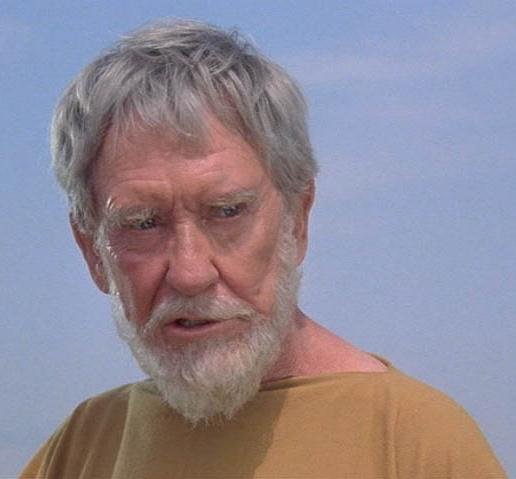 However, the best performance in the film comes from Burgess Meredith. He piles on the charm with gusto as a kindly storyteller who an obvious cinematic surrogate for Harryhausen. Like the gods in this film, he laments how people have turned away from stories and the belief in the magical that they represent. These moments add an unexpected poignancy to the Saturday-matinee fare on display here. Clash Of The Titans might not have been the ideal cinematic epilogue for Harryhausen and what he represents - but it has a certain heartfelt, homespun charm that will never be reproduced elsewhere.
However, the best performance in the film comes from Burgess Meredith. He piles on the charm with gusto as a kindly storyteller who an obvious cinematic surrogate for Harryhausen. Like the gods in this film, he laments how people have turned away from stories and the belief in the magical that they represent. These moments add an unexpected poignancy to the Saturday-matinee fare on display here. Clash Of The Titans might not have been the ideal cinematic epilogue for Harryhausen and what he represents - but it has a certain heartfelt, homespun charm that will never be reproduced elsewhere.


